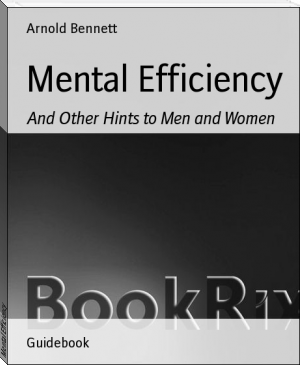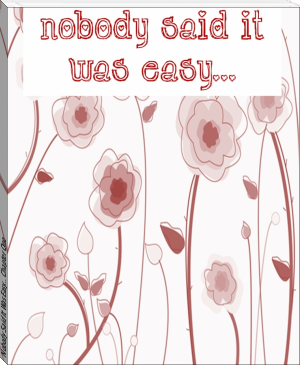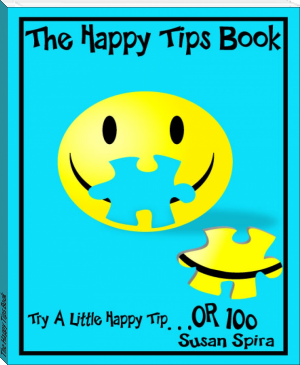Journalism for Women - Arnold Bennett (ebook reader play store .txt) 📗

- Author: Arnold Bennett
Book online «Journalism for Women - Arnold Bennett (ebook reader play store .txt) 📗». Author Arnold Bennett
But how are you, the woman who desires to be a journalist, to ascertain whether you have that genuine predisposition, those natural gifts which will renew your strength and take away the bitterness of disappointments? You may come some way towards deciding the point by answering these three questions:--
1. Are you seriously addicted to reading newspapers and periodicals?
2. Does the thought regularly occur to you, apropos of fact or
incident personally observed: "Here is 'copy' for a paper"?
3. Have you the reputation among your friends of being a good
letter-writer?
If you cannot reply in the affirmative to two of these queries, then take up pokerwork, or oratory, or fiction, or nursing, but leave journalism alone. If by good fortune you are able to say "Yes" to all three of them, you may go forward rejoicing, for only perseverance will be necessary to your success; you are indeed "called."
* * * * *
There are several ways of entering upon journalism. One is at once to found or purchase a paper, and thus achieve the editorial chair at a single step. This course is often adopted in novels, sometimes with the happiest results; and much less often in real life, where the end is invariably and inevitably painful.
Another way is to buy the sub-editorship of a third-rate paper, by subscribing towards its capital. By such a transaction one gains experience, but the cost is commonly too dear.
Another way is to possess friends of high influence in the world of journalism, who will find for one a seat in a respectable office; an office where one will be in a position to learn everything without pecuniary risk, and where one can look forward to earning a salary within a reasonable time. The sole objection to this method is that it is usually quite impracticable.
Another way is to learn shorthand and the use of the typewriter, and so obtain an editorial secretaryship. An editor's secretary has every opportunity of conning the secrets of the profession, and it is her own fault if she is not soon herself a journalist.
But the time-honoured, the only proper way of entering upon journalism is to become what is called an "outside contributor." The outside contributor sends unsolicited paragraphs and articles to papers, on the chance of acceptance. By dint of a thousand refusals, she learns to gauge the public, which is the editorial, taste, and at length, fortified by many printed specimens of her work and a list as long as your arm of the various publications for which she writes, she is able to demand with dignity a position (in the office or out of it, as her tastes lie) on the staff of some paper of renown. Some journalists are so successful as outside contributors--writing when, how, and for whom they choose--that they would scorn the offer of any regular appointment; but such are rare.
Chapter IV
The Aspirant
When you have decided to become an outside contributor you are entitled to call yourself by the proud title of "journalistic aspirant."
The procedure of the aspirant is usually this:--
She casts about for a subject on which to write, and according to her temperament and circumstances she will certainly choose one of six things:--"A Spring Reverie" (or it may be "An Autumn Reverie," as the time of year suits); or "Elsie, a character sketch" (describing one of those insufferably angelic women whom happily God never made); or "Hints on Economy in Dress"; or "My First Bicycle Ride"; or an exposure of the New Woman; or, lastly, a short story, probably styled "An Incident." and beginning: "Enid Anstruther had come to the end of her resources. As she sat by the fire that winter afternoon, the glow of the red coal playing on her soft brown hair, she reflected with a grim smile that," &c., &c.
The aspirant, left to herself, never goes beyond these six topics for her first venture.
Having written the thing, she copies it out in a hand as fair as she can compass (or, if she can afford the expense, gets it typewritten)--on one side of the paper only. She has read somewhere that manuscripts should be on one side of the paper only, and that they have a better chance of acceptance if typewritten. Next she stitches the sheets together, as a rule with black cotton; occasionally she uses a safety-pin for safety. Then she composes a pretty letter to the editor of the paper with which she happens to be most familiar, telling him that she is anxious to make a little money (though not dependent on her earnings for a livelihood), and hopes he will come to a decision on her article at his earliest convenience; she adds that she has always admired his journal, and would esteem it a great honour to be counted among his contributors.
She has previously determined to keep the whole affair a profound secret, but at the last moment she cannot refrain from showing the production, in strict confidence, to some near and dear one. This person either pronounces it to be really splendid, or damns it with a polite sneer; but whatever the event, her own golden opinion of her work is confirmed. In the act of dispatching the missive she suddenly remembers that the correct thing is to send a stamped envelope for return; she does so, only the envelope which she encloses is usually much too small to hold the manuscript.
So the article goes forth. A few days pass, and the aspirant is beginning to meditate upon the best manner of spending the money to be received for it, when lo! it returns....
* * * * *
Needless to say, the aspirant has set about the difficult business of becoming an outside contributor in quite the wrong way. Before daring to enter upon the writing of an article, it is needful that she should, in particular, make a study of four important subjects:--
1. The distinguishing characteristics, policy, and general tone of all
the leading dailies, weeklies, and monthlies.
2. Spelling.
3. Grammar.
4. Composition, including punctuation. I will deal briefly with these
four.
1. The object of the journalistic aspirant is to supply a demand. But in order successfully to supply a demand, it is necessary to know with some exactitude the nature of that demand. Of what use to send stuff to editors until you have determined what sort of stuff they lack? To obtain this valuable information (since editors do not often issue circulars defining their wants) the only way is to make a scrutiny of their papers. Go daily, therefore, to a public reading-room, and examine attentively, observantly, the contents of the various publications. Ignore no paper because it has little interest for you personally, or because you have never heard its name before. The more papers you are familiar with, the wider your field for the disposal of articles. The outside contributor can never tell what paper must serve her turn next. At any moment a subject may occur to her which will suit, say, _The Pottery Gazette and China and Glass Trades Review_, and only _The Pottery Gazette and China and Glass Trades Review._ Study styles and subjects and idiosyncrasies, and count no detail unworthy of attention. The importance to the aspirant of this branch of self-training can scarcely be magnified.
2. Few men and very few women can be trusted to spell correctly every word in common use. I have seen the MSS. of many of the foremost women journalists of the day, and have found orthographic errors in nearly all of them. Of course spelling is not a matter of the highest importance--a certain great English novelist is notoriously incompetent in this respect, and relies upon his printers--but it deserves attention. Bad spelling spoils the appearance of the cleverest article, and raises a prejudice against it in the editorial mind. And not all bad spellers have the ingenuity of Mr. Umbrage of _The Silchester Mirror_, in Mr. J. M. Barrie's novel, _When a Man's Single_:--
"When Umbrage returned, Billy Kirker, the chief reporter, was denouncing John Milton [the junior reporter] for not being able to tell him how to spell 'deceive.'
"'What is the use of you?' he asked indignantly, 'if you can't do a simple thing like that?'
"'Say "cheat,"' suggested Umbrage.
"So Kirker wrote 'cheat.'"
I think, however, that women have at last learnt to spell words ending in _ieve_ and _eive_. They go astray nowadays in _ance_ and _ence_; also in _seperate_ and _irresistable_, and in the past participles of verbs ending in _it_.
The simplest and best way to cure a case of weak spelling is to hand the dictionary to some wise friend, and ask him or her to question you. A quarter of an hour daily devoted to this treatment will effect a remarkable improvement, even when the patient happens to think there is no room for improvement.
3. Grammar, I suppose, is taught in girls' schools on approved modern principles; nevertheless few women seem to have any acquaintance with it. Yet grammar is not a difficult study, nor a lengthy one, and an understanding knowledge of its principles is of the greatest assistance in the formation of a good literary style. This is a truism: that is why it needs saying again.
You will find Dr. Richard Morris's _Primer of English Grammar_ (Macmillans, _1s_.), with Mr. John Wetherell's _Exercises on Morris's English Grammar_ (same publishers and price), very useful, and, though they are small books, quite adequate to your needs. Both can be mastered in a month. The first business is to learn to parse. To parse is "to explain the duty each word performs in a sentence: that is, to tell the relation each word bears to the rest in a sentence:" the definition clearly shows how indispensable to a writer is some skill in parsing. Of course many of the exercises are set obviously for children, but sufficient remain to puzzle the woman of average intelligence. That lady might, for example, have a difficulty in parsing the italicised words in the following: "My cap, having _stuck on_ a long _time_, now went _whirling_ down the lane." Afterwards comes analysis--the breaking up of a sentence





Comments (0)